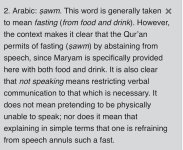danielmahmood
New member
Peace all
2:183 "O you who heed warning: fasting is prescribed for you - as it was prescribed for those before you, that you might be in prudent fear"
Fasting is a very important action for physical, spiritual and mental health. I have linked two videos to brother Sam Gerrans channel on fasting as well as one video to brother Said Mirza's channel
I think a thread on fasting/ diet/ lifestyle will be beneficial as it'll keep people accountable and ensure we don't fall into gluttony
2:183 "O you who heed warning: fasting is prescribed for you - as it was prescribed for those before you, that you might be in prudent fear"
Fasting is a very important action for physical, spiritual and mental health. I have linked two videos to brother Sam Gerrans channel on fasting as well as one video to brother Said Mirza's channel
I think a thread on fasting/ diet/ lifestyle will be beneficial as it'll keep people accountable and ensure we don't fall into gluttony
